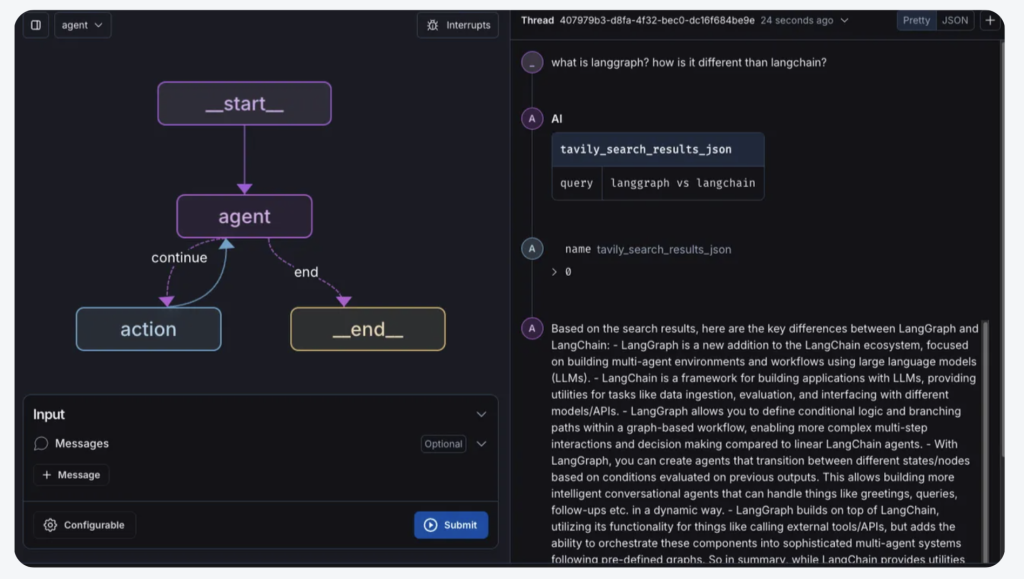LangChain Introduces LangGraph Studio: The First Agent IDE for Visualizing, Interacting with, and Debugging Complex Agentic Applications

Large Language Models (LLMs) have revolutionized the development of agentic applications, necessitating the evolution of tooling for efficient development. To tackle this issue, Langchain introduced LangGraph Studio as the first integrated development environment (IDE) specifically designed for agent development, which is now available in open beta.
LangGraph Studio offers a robust approach to developing LLM applications, providing a specialized agent IDE for visualizing, interacting with, and debugging complex agentic applications. This article will provide an overview of LangGraph and explore how LangGraph Studio streamlines the development process for agentic applications.
LangGraph, launched in January 2023, is a highly controllable, low-level orchestration framework for building agentic applications. Since its inception, it has undergone significant improvements, leading to a stable 0.1 release in June. LangGraph features a persistence layer enabling human-in-the-loop interactions and excels at building complex applications requiring domain-specific cognitive architecture.
Fully open-source and available in both Python and JavaScript, LangGraph works with or without LangChain and integrates seamlessly with LangSmith. Its versatility and robustness make it an ideal choice for developing production-ready agentic applications.
While LangGraph provides a powerful framework for developing agentic applications, the unique nature of LLM application development demands specialized tooling beyond traditional code editors. LangGraph Studio addresses this need by offering an augmented development experience tailored specifically for LangGraph applications.
The studio facilitates easy visualization and interaction with agent graphs, complementing rather than replacing traditional code editors. By allowing developers to visualize graphs, understand their structure, and modify agent results or node logic mid-trajectory, LangGraph Studio creates an iterative process that enhances the overall development experience.
LangGraph Studio is currently available as a desktop app for Apple Silicon, with support for more platforms coming soon. To get started, users need to download the app and log in with their LangSmith account. The studio requires a directory containing a Python file with a defined graph and a langgraph.json file specifying details such as agent definition, dependencies, and environment variables.
Once set up, LangGraph Studio provides a visualization of the graph along with an interaction box for the agent. Users can observe real-time information about agent steps, interrupt the agent if needed, and run it in debug mode for step-by-step analysis.
LangGraph Studio offers several powerful features that enhance the agent development process. Users can interact with the agent’s state at any point, modifying responses to simulate different outcomes. The studio also detects changes in underlying code files, allowing for prompt updates and node reruns without leaving the code editor.
These features make it significantly easier to iterate on long-running agents, providing a more efficient and intuitive development experience for agentic applications.
As the landscape of agentic application development continues to evolve, tools like LangGraph Studio become increasingly essential. By offering a specialized IDE designed for agents, LangGraph Studio represents a significant step forward in streamlining the development process for LLM applications.
While traditional code editors remain important, the unique challenges of building agentic applications require new, tailored solutions. LangGraph Studio aims to fill this gap, enhancing developer workflows and facilitating the creation of more sophisticated and efficient agentic applications.
Check out the Details and Documentation. All credit for this research goes to the researchers of this project. Also, don’t forget to follow us on Twitter and join our Telegram Channel and LinkedIn Group. If you like our work, you will love our newsletter..
Don’t Forget to join our 47k+ ML SubReddit
Find Upcoming AI Webinars here
Shoaib Nazir is a consulting intern at MarktechPost and has completed his M.Tech dual degree from the Indian Institute of Technology (IIT), Kharagpur. With a strong passion for Data Science, he is particularly interested in the diverse applications of artificial intelligence across various domains. Shoaib is driven by a desire to explore the latest technological advancements and their practical implications in everyday life. His enthusiasm for innovation and real-world problem-solving fuels his continuous learning and contribution to the field of AI









